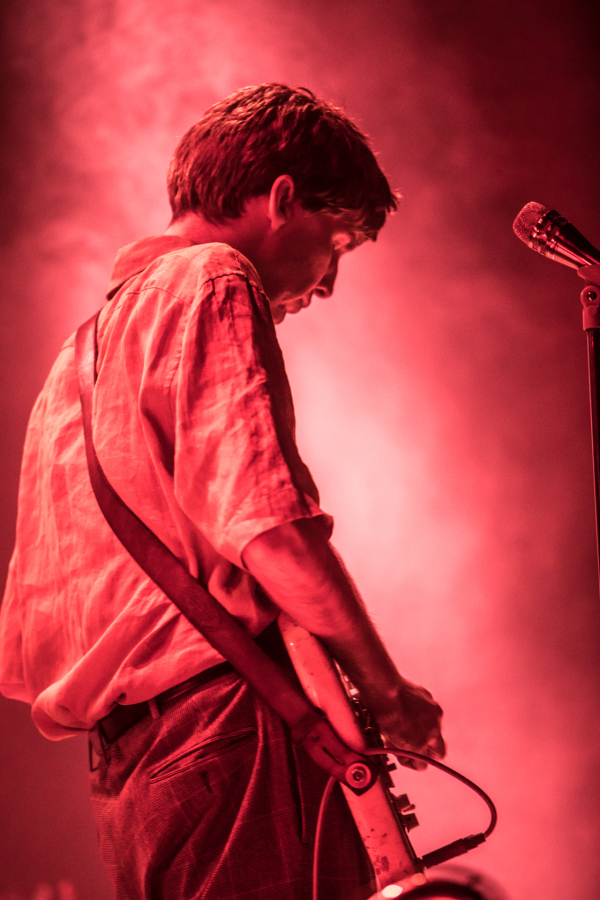Photo by JOSH PELTA-HELLER
Over the course of eight studio albums since their inception in 2001, Deerhunter have grown to be a canonical act in the realm of psychedelic indie-rock. Fronted by multi-instrumentalist and founder Bradford Cox, the band have undergone a series of lineup changes marked by tragedy: two bassists, Justin Bosworth and Josh Fauver died while they were in Deerhunter, the former from a skateboarding head-injury and the latter from unannounced causes. Deerhunter’s self-described “ambient punk” has steadily morphed from wild, psychedelic garage-punk to poppy indie-rock. The band are on the road once again following the release of their latest album, Why Hasn’t Everything Already Disappeared? (2019). In accordance with their discography’s trajectory, this record takes Deerhunter’s whippits-and-acid sound to more predictable and accessible song structures than what comprises earlier albums, like Turn it Up Faggot (2005) and Cryptograms (2007). It didn’t demonstrate the erratic, tripped-out noisiness I love about Deerhunter, but I knew they weren’t done putting on spectacular shows. Last night’s performance at Union Transfer was proof of that.
Deerhunter opened with the ambient “Intro” into “Cryptograms” as beams of yellow spotlights pierced through pink-lit fog. Being one of their earliest and best tunes, it was the perfect opener to ease the often held anxiety long-time fans get when they don’t want new material to outweigh the old. Of this I am guilty, but Deerhunter didn’t let me down. According to the setlist I scored (for I will not credit my faulty memory), they played seven songs off of the new record out of the sixteen songs they played.
About halfway through the set, Cox noticed a fan’s Skinny Puppy t-shirt and commented that his cousin gave him that tape when he was nine. “That and White Light/White Heat,” he added. He then noted that he didn’t really like White Light/White Heat; he had always wondered why they “weren’t trying.” He said something along the lines of “At least Skinny Puppy were cool.” Then, Cox ranted about how Skinny Puppy might have been more successful if they’d been called something more lighthearted, like Skippy Puppy, instead, and how he never really cared for the name Deerhunter, which he has expressed numerous times in the past. The band name had been chosen by their first drummer, Dan Walton. Cox made a point to announce that he and the band do not condone violence against animals or people or anything else.
Later in the show, Cox climbed down off the stage to briefly sing among the audience. Deerhunter closed their set with “Nocturne,” during which Cox handed his tambourine to an audience member in the front row who was wearing a Slowdive shirt from their 2018 tour. I recall seeing him at that show at Union Transfer, where I bought that shirt too, and later that year at the Thurston Moore show at RUBA Club, where he was wearing the same shirt. Unfortunately, the guy has no sense of rhythm, and despite Cox’s coaxing, the Slowdiver simply could not maintain the slightest approximation of tempo. And as nearby audience members exchanged snickers and eyerolls, the bald man with the tambourine basked passionately in his temporary role of Deerhunter auxiliary percussionist.
For the encore, the band indulged us in Microcastle (2008) classics “Cover Me (Slowly)” into “Agoraphobia.” They then finished with “Monomania,” off of the 2013 album of the same name, which featured a thirty-minute noise outro. Commencing the outro, most of the band exited the stage, leaving Cox belly-down with his yellow Jazzmaster hoisted over the monitor at the front of the stage, letting Tambourine-guy strum erratically for about ten minutes until Cox lifted his head from the monitor and handed his guitar to a roadie to be put back on its stand. Cox then plopped back down to use the monitor as a pillow while the wall of noise persisted. It was akin to the so-called “Holocaust Section” of My Bloody Valentine’s “You Made Me Realise,” except no band members were left playing instruments; it was just an autonomous banshee of rumbling and screeching feedback. I was mesmerized. Cox occasionally sat up and looked around in a daze, giving a stretch and a yawn, only to return theatrically to his slumber, noise as his blanket. At one point, he kicked off his shoes to get more comfortable. One guy squeezed his way up to the front to take a selfie with Cox’s sleeping head before calling it a night. Looking around about twenty minutes in, I noticed that most of the audience had left, and many who remained soldiered on with their fingers in their ears and a wincing in their eyes. Eventually, Cox got up, gathered his shoes, coat, and green tea, and drifted backstage. There were only about twenty or thirty of us left to witness those final moments. — KYLE WEINSTEIN

